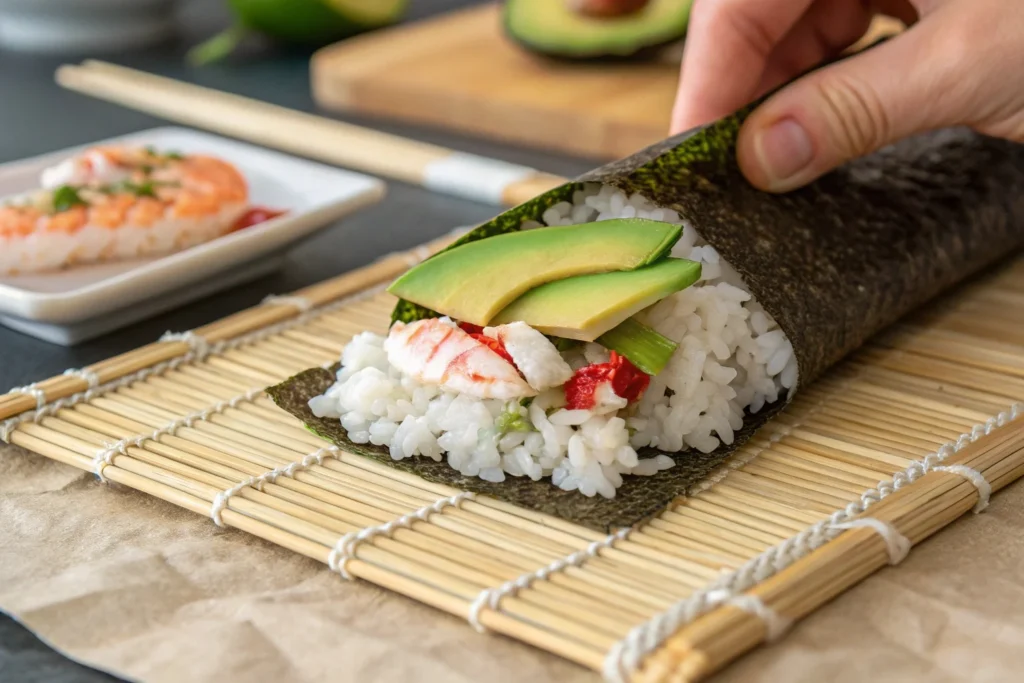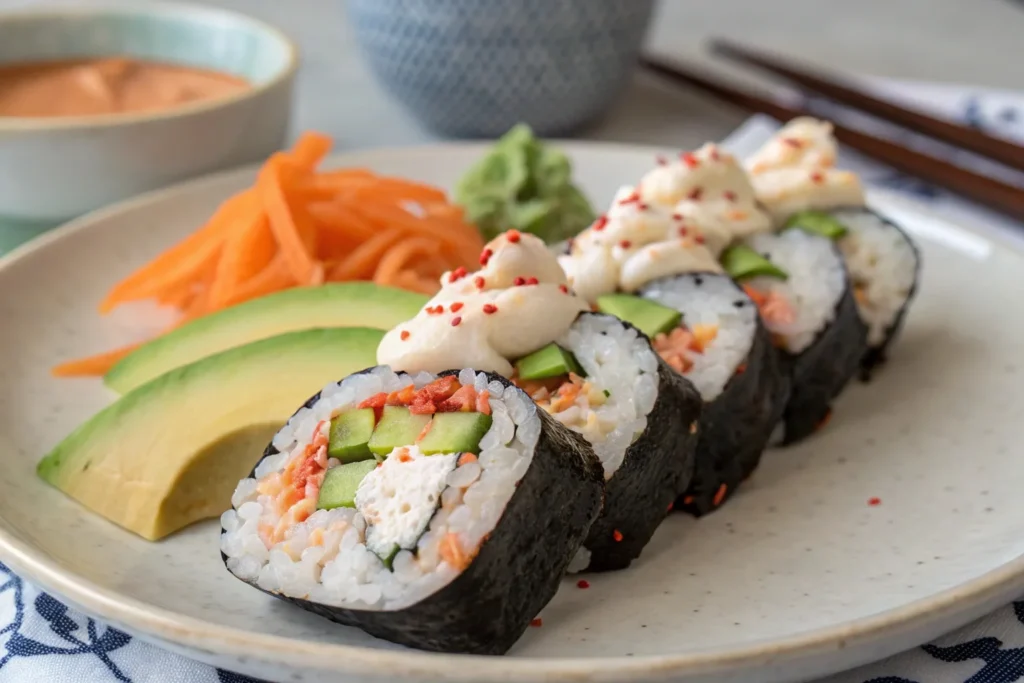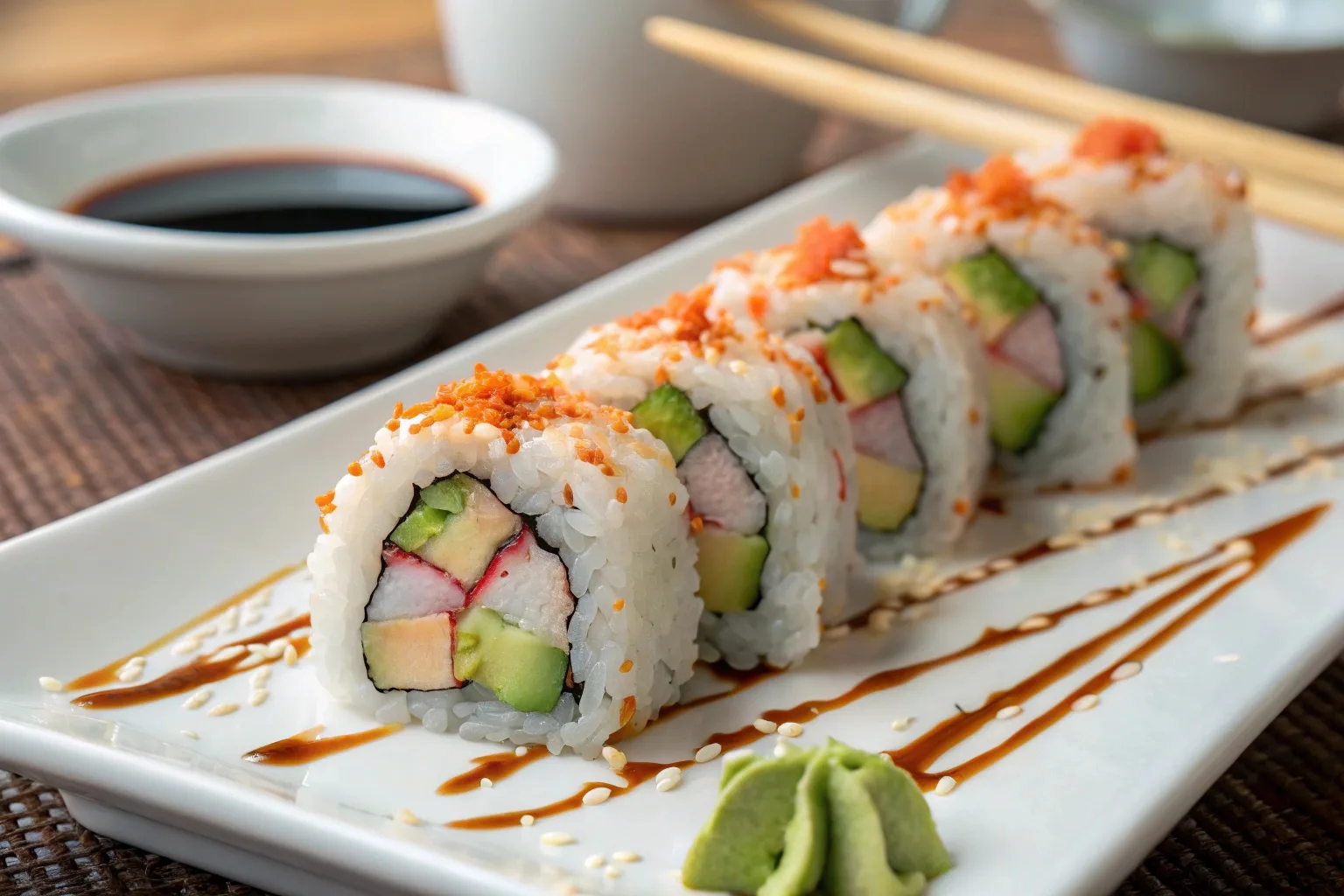Table of Contents
Is Spicy California Roll Healthy? A Complete Nutritional Breakdown
Introduction
Sushi has become a go-to meal for those looking for a tasty yet seemingly healthy option. Among the many sushi varieties, the spicy California roll stands out as a fan favorite, offering a delicious combination of creamy avocado, imitation crab, seasoned sushi rice, and a kick of spicy mayo. But just because it’s sushi, does that mean it’s healthy?
In this article, we’ll break down the nutritional value of a spicy California roll, analyze its calorie count, fat content, and sodium levels, and see how it fits into a balanced diet. Whether you’re watching your weight, looking to improve your diet, or simply curious about your favorite sushi roll, this guide will help you make an informed decision.
Understanding the Spicy California Roll
What is a Spicy California Roll?
A spicy California roll is a variation of the classic California roll, a sushi roll made with sushi rice, nori (seaweed), imitation crab (or real crab), cucumber, and avocado. The “spicy” twist comes from the addition of spicy mayo, a blend of mayonnaise and Sriracha sauce, which adds a creamy and fiery kick.
Unlike traditional Japanese sushi, the California roll is an inside-out roll (uramaki), meaning the rice is on the outside while the filling is wrapped inside with seaweed. This makes it visually appealing and easy to eat.
Ingredients Breakdown: Crab, Avocado, Rice, and Spicy Mayo
A typical spicy California roll consists of the following ingredients:
| Ingredient | Nutritional Benefits | Potential Concerns |
|---|---|---|
| Imitation Crab (or real crab) | Low in fat, contain protein | High in sodium and additives (if imitation) |
| Avocado | Rich in healthy fats and fiber | Calorie-dense |
| Sushi Rice (white rice) | Provides carbohydrates for energy | High glycemic index |
| Nori (seaweed) | Packed with iodine and minerals | Usually present in small amounts |
| Cucumber | Hydrating, low in calories | No concerns |
| Spicy Mayo (mayo + Sriracha) | Adds flavor, some healthy fats | High in calories and fat |
Each of these ingredients plays a role in the overall nutritional profile of the spicy California roll. Some contribute essential nutrients, while others may increase calorie and sodium content.
Nutritional Profile of Spicy California Roll
Calories and Macronutrient Breakdown (Carbs, Proteins, Fats)
The calorie count of a spicy California roll depends on portion size and the ingredients used. On average, one roll (6-8 pieces) contains:
- Calories: 400-500 kcal
- Carbohydrates: 50-60g
- Protein: 10-15g
- Fat: 15-25g
- Sodium: 800-1000mg
Breakdown of Key Macronutrients:
- Carbs: The primary source of calories comes from sushi rice, which is high in simple carbohydrates. If you’re watching your blood sugar levels, this could be a concern.
- Protein: The roll contains a moderate amount of protein, mostly from imitation crab (or real crab) and the mayonnaise.
- Fat: The fat content varies depending on the amount of avocado and spicy mayo used. While avocado provides healthy monounsaturated fats, spicy mayo can add unhealthy fats and extra calories.
Vitamins and Minerals in the Ingredients
The spicy California roll isn’t just about calories—it also provides some essential nutrients.
| Vitamin/Mineral | A source in the Roll | Health Benefits |
|---|---|---|
| Omega-3 Fatty Acids | Avocado, real crab (if used) | Supports heart and brain health |
| Vitamin C | Cucumber, avocado | Boosts immunity and skin health |
| Vitamin B12 | Crab (real or imitation) | Essential for energy and red blood cell formation |
| Iodine | Nori (seaweed) | Supports thyroid function |
| Fiber | Avocado, cucumber | Aids digestion and promotes fullness |
While these nutrients are beneficial, it’s important to consider the balance of calories, sodium, and fats in each serving.
Is Spicy California Roll Good for Weight Loss?

Caloric Density and Portion Control
When considering weight loss, calorie intake and portion sizes are crucial. A spicy California roll typically contains 400-500 calories, making it a moderate-calorie meal option. However, several factors may affect its suitability for weight loss:
- High Carb Content – Sushi rice is made with white rice and sugar, contributing to a high glycemic index (GI), which can cause blood sugar spikes and hunger soon after eating.
- Spicy Mayo Adds Extra Calories – A significant portion of the calories in a spicy California roll comes from spicy mayo, which is high in fat.
- Portion Control Challenges – Sushi rolls are small, and many people eat two or more rolls in one sitting, potentially doubling or tripling the calorie count.
Weight Loss Tips for Sushi Lovers
If you’re looking to lose weight while still enjoying spicy California rolls, consider these strategies:
✔ Stick to One Roll – Eating just one roll (6-8 pieces) keeps calories in check.
✔ Pair it with Protein – Add a side of edamame or a miso soup to increase satiety.
✔ Swap White Rice for Brown Rice – Brown rice has more fiber and a lower glycemic index, keeping you full longer.
✔ Reduce Spicy Mayo – Ask for light spicy mayo or replace it with Sriracha alone for fewer calories.
✔ Opt for Sashimi or Hand Rolls – Hand rolls have less rice and more filling, reducing overall carb intake.
By making small adjustments, spicy California rolls can fit into a balanced weight-loss plan without sabotaging progress.
Is Spicy California Roll High in Sodium and Fats?
Sodium Content and Health Concerns
One major concern with spicy California rolls is their high sodium content. A single roll can contain 800-1000mg of sodium, which is about 40-50% of the recommended daily intake. The main sodium sources include:
| Source | Sodium Contribution |
|---|---|
| Imitation crab | High sodium from preservatives |
| Sushi rice | Seasoned with vinegar, sugar, and salt |
| Soy sauce | Extremely high in sodium (1 tbsp = 900mg) |
| Spicy mayo | Contains sodium from mayo and Sriracha |
Ways to Reduce Sodium Intake
✔ Ask for low-sodium soy sauce or skip it entirely.
✔ Choose rolls with real crab instead of imitation crab to lower sodium intake.
✔ Limit additional sauces like eel sauce or extra spicy mayo.
✔ Drink plenty of water to help flush out excess sodium.
Excessive sodium intake can lead to high blood pressure, water retention, and increased heart disease risk, so moderation is key.
Unhealthy vs. Healthy Fat Sources in the Roll
Fat is another component of the spicy California roll that can be both good and bad, depending on the source.
| Fat Source | Type of Fat | Health Impact |
|---|---|---|
| Avocado | Healthy monounsaturated fats | Supports heart health, provides fiber |
| Spicy Mayo | Saturated and processed fats | Increases calorie intake, may contribute to weight gain |
| Imitation Crab | Small amounts of fat, mostly from additives | Can contain unhealthy trans fats in some varieties |
✔ To keep it healthy, enjoy the avocado but limit the spicy mayo.
✔ If possible, request light mayo or a mayo-free version to cut down on saturated fats.
Benefits of Eating Spicy California Roll
While there are concerns about calories, sodium, and fat content, the spicy California roll also has some important health benefits when consumed in moderation.
1. Omega-3 Fatty Acids from Avocado and Crab
- Avocado is a great source of heart-healthy monounsaturated fats and omega-3 fatty acids, which help reduce inflammation and support brain function.
- Real crab (if used instead of imitation crab) is rich in lean protein and omega-3s, promoting heart health and muscle repair.
2. Good Source of Fiber and Micronutrients
- Avocado and cucumber provide fiber, which helps with digestion and satiety.
- Nori (seaweed) is rich in iodine, iron, and antioxidants, supporting thyroid function and immunity.
3. Moderate Protein Content for Muscle Maintenance
- One spicy California roll contains about 10-15g of protein, which can help maintain muscle mass and support metabolism.
- If made with real crab, protein content increases, making it a more filling meal option.
4. Can Be a Balanced Meal with Smart Choices
When eaten in moderation and paired with healthier choices, a spicy California roll can be part of a nutritious diet. To maximize benefits:
✔ Opt for real crab over imitation for better protein and fewer additives.
✔ Pair with a side of vegetables or miso soup for a more balanced meal.
✔ Choose brown rice for added fiber and a lower glycemic impact.
Complete Nutritional Breakdown
Health Risks of Eating Spicy California Roll Regularly
While a spicy California roll offers some health benefits, consuming it frequently may not be ideal due to certain risks. Here’s what you need to watch out for:
1. Processed Imitation Crab: Good or Bad?
Many spicy California rolls are made with imitation crab (surimi) instead of real crab. While it provides protein and a seafood-like taste, it also comes with drawbacks:
| Concern | Why It’s an Issue |
|---|---|
| High in Sodium | Contains added salt and preservatives |
| Contains Additives | May include starch, MSG, and artificial flavors |
| Low in Omega-3s | Unlike real crab, imitation crab has little to no omega-3s |
Healthier Alternative:
✔ Choose sushi rolls made with real crab or shrimp instead of imitation crab.
✔ If eating imitation crab, limit consumption to avoid excessive sodium and additives.
2. Risks of High Sodium and Artificial Additives
As mentioned earlier, spicy California rolls can be high in sodium. A diet high in sodium may contribute to:
❌ Increased blood pressure
❌ Water retention and bloating
❌ Higher risk of heart disease
Additionally, spicy mayo and soy sauce contain preservatives, MSG, and processed fats, which may not be ideal for those watching their heart health and weight.
Healthier Alternative:
✔ Opt for low-sodium soy sauce or skip it altogether.
✔ Request light spicy mayo or use plain Sriracha for a spicy kick.
3. Mercury Concerns in Sushi
While California rolls typically don’t contain high-mercury fish, consuming other sushi rolls with tuna or mackerel regularly can increase mercury exposure. Mercury buildup can affect brain function, nervous system health, and pregnancy safety.
Healthier Alternative:
✔ Balance sushi consumption with low-mercury fish like salmon, shrimp, and crab.
✔ Rotate between sushi and other protein sources like lean chicken, tofu, or beans.
How to Make a Healthier Version at Home

If you love spicy California rolls but want a healthier alternative, you can make a nutrient-packed version at home with these ingredient swaps:
Healthier Ingredient Substitutions
| Traditional Ingredient | Healthier Swap | Why It’s Better |
|---|---|---|
| White Sushi Rice | Brown rice or cauliflower rice | More fiber, lower glycemic index |
| Imitation Crab | Real crab or shrimp | Higher protein, fewer additives |
| Spicy Mayo | Greek yogurt + Sriracha | Lower fat and calories |
| Full Roll | Hand roll (temaki) | Uses less rice, fewer carbs |
| Soy Sauce | Low-sodium soy sauce or coconut aminos | Reduces sodium intake |
Step-by-Step Guide to Making a Healthy Spicy California Roll
Ingredients:
- 1 cup cooked brown rice or cauliflower rice
- ½ avocado, sliced
- 3 oz real crab meat (or shrimp)
- 1 sheet nori (seaweed)
- ¼ cup thinly sliced cucumber
- 1 tbsp Greek yogurt mixed with Sriracha (healthier spicy mayo)
- Low-sodium soy sauce (for dipping, optional)
Instructions:
- Lay the nori sheet on a bamboo sushi mat, rough side up.
- Spread a thin layer of brown rice or cauliflower rice over the nori.
- Add cucumber, avocado, and real crab in the center.
- Drizzle with Greek yogurt Sriracha mix.
- Roll tightly, using gentle pressure to shape the roll.
- Slice into 6-8 pieces and enjoy with low-sodium soy sauce or wasabi.
These simple swaps allow you to enjoy a lower-calorie, nutrient-dense spicy California roll without sacrificing flavor!
Comparing Spicy California Roll to Other Sushi Rolls
Not all sushi rolls are created equal. Here’s how the spicy California roll compares to other popular sushi rolls:
| Sushi Roll | Calories | Carbs | Protein | Sodium | Healthiest Choice? |
|---|---|---|---|---|---|
| Spicy California Roll | 400-500 | High | Moderate | High | Moderate |
| Tuna or Salmon Sashimi | 150-200 | Very Low | High | Low | ✅ Best for Low-Carb Diets |
| Avocado Roll | 250-300 | Moderate | Low | Low | ✅ Good Vegan Option |
| Shrimp Tempura Roll | 500-600 | High | Moderate | High | ❌ High in Fat & Calories |
| Rainbow Roll (Mixed Fish) | 475-550 | High | High | Moderate | ✅ Protein-Packed Choice |
| Spicy Tuna Roll | 290-350 | Moderate | High | Moderate | ✅ Good Balance of Protein & Carbs |
Key Takeaways:
✔ Best for weight loss: Sashimi or avocado roll.
✔ Best for protein: Rainbow roll or spicy tuna roll.
✔ Worst for health: Shrimp tempura roll due to deep-fried ingredients.
If you love spicy California rolls but want a healthier alternative, choosing sashimi or rolls with lean proteins can be a better option.
FAQs About Spicy California Roll
To wrap up our deep dive into spicy California rolls’ health benefits and concerns, here are some frequently asked questions (FAQs) to help clarify common doubts.
Is spicy California roll good for a diet?
It depends. If eaten in moderation, a spicy California roll can fit into a balanced diet. However, it’s not the best option for low-calorie or low-carb diets due to its high rice and spicy mayo content. For a healthier choice:
✔ Limit yourself to one roll per meal.
✔ Choose brown rice instead of white rice for more fiber.
✔ Skip or reduce spicy mayo to cut down on fat and calories.
Does a spicy California roll have a lot of calories?
Yes, one roll contains about 400-500 calories. The calorie count increases if extra spicy mayo, soy sauce, or multiple rolls are consumed. If you’re trying to lose weight, be mindful of portion sizes.
Is imitation crab healthy?
Not really. While imitation crab is low in fat and calories, it’s a highly processed food containing starches, preservatives, and added sodium. For a healthier option, opt for real crab, shrimp, or salmon.
Is spicy mayo unhealthy?
Yes, spicy mayo is high in calories and fat, as it is made from mayonnaise and Sriracha. While it adds flavor, it also significantly increases fat content. A healthier alternative is Greek yogurt mixed with Sriracha, which cuts calories while keeping the spicy kick.
What is the healthiest sushi roll?
Some of the healthiest sushi roll options include:
✔ Avocado roll – Low in calories, high in healthy fats.
✔ Tuna or salmon roll – High in protein and omega-3s.
✔ Cucumber roll – Low in calories, refreshing, and hydrating.
✔ Rainbow roll – A good mix of lean protein and veggies.
How often can you eat spicy California rolls?
Occasionally, but not daily. Due to high sodium, processed imitation crab, and spicy mayo, eating spicy California rolls too frequently may not be ideal for heart health and weight management. For a balanced diet, try to limit consumption to once a week and pair it with healthier sides like miso soup or seaweed salad.
Conclusion: Should You Eat Spicy California Roll Regularly?
Final Verdict: Is It Healthy or Not?
✔ Spicy California rolls can be part of a healthy diet—if consumed in moderation and with the right modifications.
✔ The roll provides fiber, omega-3s, and protein, but also high sodium and processed ingredients.
✔ Making healthier swaps (brown rice, real crab, light mayo) can enhance its nutritional value.
Tips for Enjoying It in Moderation
✅ Stick to one roll per meal to control calories.
✅ Choose low-sodium soy sauce to reduce sodium intake.
✅ Pair with protein-rich sides like edamame or miso soup.
✅ Make it at home using healthier ingredients for a lighter version.
Bottom Line:
A spicy California roll is not the healthiest sushi option, but with small adjustments and mindful eating habits, you can enjoy it without guilt while maintaining a balanced diet.

